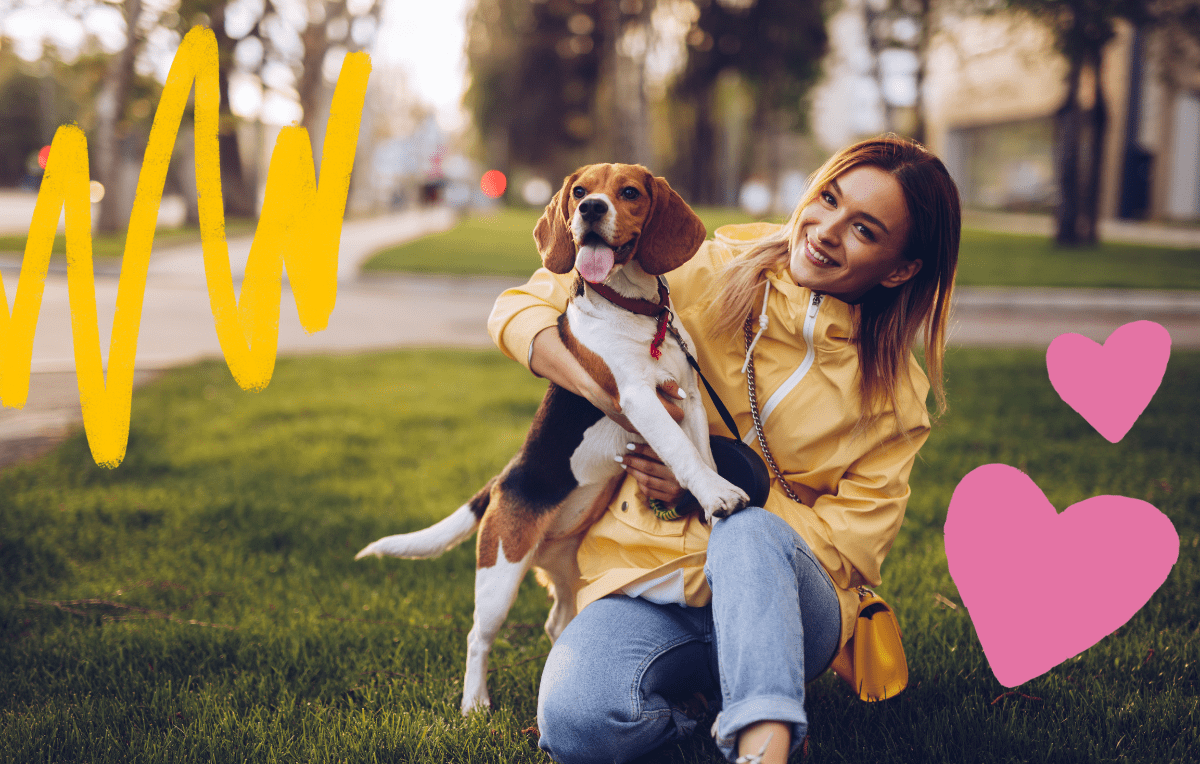Pets and Mental Health: A Reciprocal Relationship
By Susan Doktor
At DOGTV, we’re all about educating dog parents on canine health and providing dogs with the entertainment, stimulation, and “company” they need to live
mentally-engaged, stress-free lives.
As a dog parent, you care about your dog’s mental health and do what you can to ensure their happiness. Affection, exercise, good nutrition, and proper veterinary care are among your priorities.
If money is a measure of love, consider this: American families spent $123.6 billion on pet food and pet treats in 2021 and another $50 billion on veterinary care. More and more dog owners are purchasing pet insurance than ever before to offset the cost of doggy medicine.
Incidentally, most pet insurance policies include coverage for mental health services for dogs, too. Many dog owners have already intuited that mental health is a two-way street for dogs and humans. Our actions influence how well-adjusted our dogs are. However, science has demonstrated that the relationship is reciprocal.
Yes, indeed. Dogs can play an essential role in their owners’ mental health, too. Let’s take a look at how that works.
It Comes Down to Brain Chemistry
The brain is a complicated and sensitive organ. When we experience stress, the brain releases a bunch of different stress hormones. Stress hormones have been implicated in inflammation, which can lead to both physical and mental health problems.
One of the most important stress hormones is cortisol. Cortisol can indeed help us out of tough situations—particularly by giving our bodies a powerful energy boost.
Cortisol gives us the extra energy we need to flee from dangerous situations. For one thing, it increases the amount of glucose delivered to your brain. Call it a natural sugar rush. However, too much cortisol can be detrimental when you experience chronic stress. You don’t want too much cortisol floating around your system.
That’s where dogs come in. Simply petting your pup can reduce the amount of cortisol the body produces. Here’s a case in point. Johns Hopkins Medical School reports that “… an astonishing 84 percent of post-traumatic stress disorder patients paired with a service dog reported a significant reduction in symptoms, and 40 percent were able to decrease their medications.”
Some Hormones Improve Mental Health
In addition to battling the bad guy, cortisol, living with dogs increases another
hormone in your body: oxytocin. Oxytocin is a feel-good hormone. It’s sometimes
called the “Love Hormone.” It’s the hormone behind the mother/child bond and is also produced by hugging, kissing, and intimate relationships. You definitely want more oxytocin in your life.
Living with a dog can also increase the number of endorphins in your body. Endorphins make you feel exhilarated. Lots of things can trigger your body to create them. Exercise is one of them. You’ve probably heard about “runner’s high.” That’s the rush that all kinds of exercisers get when they complete a great workout.
You can experience a version of runner’s high just by taking Fido or Fluffy out for a long walk in the park. For dog owners, exercise is a daily imperative, which puts them ahead of the game when it comes to experiencing good mental health.
Laughter is another endorphin trigger. If nothing else, dogs are hilarious. They give us reasons to chuckle, even when the chips are down. And with every guffaw, you’re making in more endorphins. Dogs can remind us that things are not so bad after all.
What Kinds of Dogs Improve Mental Health?
Some dogs are certified service or therapy dogs. These dogs are well-educated:
they’re trained to take care of chores you can’t manage or act in comforting ways
when they recognize the signs of stress in their humans. But every dog has the
potential to make you feel better!
The trick is to choose a dog that won’t inadvertently increase your stress level. You don’t want to shoehorn a big ole St. Bernard into a studio apartment. You’re bound to drive each other nuts. Nor do you want to choose a border collie or other dog that needs a lot of exercise if you don’t have the time or the physical stamina to meet its exercise needs. Nobody wants their dog to be a source of guilt, right?
What Kinds of Mental Health Symptoms Can Dogs Help With?
The short answer is a lot of them!
People who suffer from anxiety benefit from having dogs by their side. Dogs provide a comforting routine that dog owners can depend on to keep them grounded in the here and now. They occupy our thinking, which keeps us from ruminating on some future event that may never come to pass.
Then there’s loneliness. Dogs keep us company when no one else is around. Think about it. The sound of a snoring puppy in your lap. The delightful sensation you get when your fingers are stroking a silky dog ear. Persistent nose nudges and other attention-seeking behaviors. That last one is your dog’s way of saying, “I’m here! I’m here!” when your apartment is just too quiet. And then there’s the feeling of knowing somebody loves you—no matter what.
Most dog owners will agree, that’s pretty incomparable. Once again, science backs up what we already know by instinct and experience. A recent survey conducted by the Human Animal Bond Research
Institute in conjunction with pet food giant Mars Petcare found that 80% of pet owners
report that having pets makes them feel less lonely. Pets are our friends and give us
emotional support, just like humans do.
Pets can also help relieve symptoms of depression. Depression is caused in large
measure by a chemical imbalance in our brains. Among other chemicals that affect our moods, like oxytocin and endorphins, owning a dog has been demonstrated to increase the levels of two other neurotransmitters: serotonin and dopamine. Anti-depressants work in part by increasing levels of these same chemicals.
Can dogs alone cure depression? That’s not likely. But dog ownership is one more tool in the fight against depression, just like eating right, getting enough exercise, avoiding alcohol and drug use, and speaking to a mental health professional.
Finally, you might be interested to know that interacting with dogs can improve your social skills. If you feel awkward around people and find human interaction
challenging, you can learn to be more socially at ease by practicing with your dog.
Owning a dog can also make you more attractive to others, as one study of dating sites revealed. People who post photos of dogs on their online dating profiles are 63% more likely to get positive reactions from other daters.
Want to Learn More?
At DOGTV, we think that the bond that forms between dogs and dog parents is a
doggone fascinating subject.
Maybe you do, too. If so, here are a few resources you might want to check out for more information on what makes our canine relationships tick and how to find a dog to help you feel better.
● Human Animal Bond Research Institute
● Best Friends
● Autism Speaks
● K9s For Warriors
● National Institute of Health
● Human Animal Bond Trust
Author Bio:
Susan Doktor is a journalist, business strategist, and mom to Sophie the Golden
Retriever. She frequently covers pet and finance subjects in her work. Her
contribution comes to us courtesy of Money.com.


